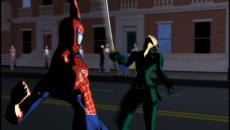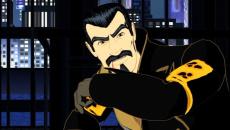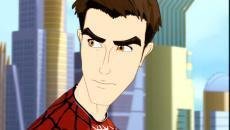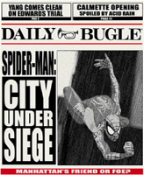 |
|
· Character Bios · Episode Guide · Episode Reviews · Backstage · DVD Releases · Message Board · MAA Home Page
|
|
|
Having served on such series as The Batman, Starship Troopers and the upcoming The Legion Of Superheroes and Superman: Doomsday, The Marvel Animation Age caught up with Brandon to talk about his work on the 3D Spider-Man: The New Animated Series.
Vietti: I had been working at Sony for several years doing both storyboarding and directing duties on shows like Godzilla, Jackie Chan, Roughnecks: Starship Troopers Chronicles, and Max Steel. Working on the CGI action shows (Roughnecks and Max) gave me some great experience with the 3D medium and I think that helped me get the directing job for Spidey. Audu Paden, a producer on Spider-man and my former boss from Roughnecks, asked me on board the show.
MAA: What exactly are the duties of the director of an animation feature?
 Vietti: Directors help control the translation of the script to the screen by
overseeing the design and storyboard process. It's our job to try to
make sure the on screen visuals are as moving, dynamic, and impactful
as the script if not more so. That's the short answer.
Vietti: Directors help control the translation of the script to the screen by
overseeing the design and storyboard process. It's our job to try to
make sure the on screen visuals are as moving, dynamic, and impactful
as the script if not more so. That's the short answer.As soon as a script is completed it's given to the director. Ideas are then exchanged with the producers regarding the mood, design, and pacing of the story. Preliminary design meetings are held to help guide designers to create characters, props, and backgrounds that work with the story and staging needs of the script as well as any additional ideas the director may have for the story. Directors then break the script into sections. Each section is assigned to a storyboard artist along with specific direction on how to translate the words on the page into shots on a storyboard. Quite often a director will also take on a section to storyboard when time allows. Four weeks later, the boards are collected and the director goes over them to try to make enhancements and revisions that make the action, story, and visuals even better. The director will continue to watch over the show for another month as it continues through the final stages of production which include color design and timing. Then the board is sent away for animation.
MAA: The series was originally planned to be based upon the Ultimate Spider-Man comic book, but was quickly revamped as a follow up to the Spider-Man movie following it's phenomenal success. How did this change the show for you personally, and do you think the show is better off for it?
Vietti: I'm not as familiar with what the series direction was supposed to have been in it's earliest conception as the writers and producers would be. But I have to say that having the series follow up the movie made for a unique series and I think that worked for us.
The thing about classic super hero cartoons is that they will be relaunched and reinvented over and over again. Personally, I like to see a slightly different take on a character with each relaunch as long as that different take stays true to the core of the character from the original source. I think our series stayed true to the Spider-man and company we know from the comics but at the same time they were brought to life in a new and interesting way.
MAA: What was different about working on Spider-Man as opposed to other animation projects such as The Batman or Superman: Doomsday?
Vietti: One of the cool things about working with Spider-Man as opposed to any other super hero is getting to play with how he moves. In animation you always have to think about how a character moves and how you can make those movements unique. With Spidey, the movements are built in. Anyone who's ever read a Spider-man comic knows how he moves and no other character out there moves like him. So it's it's just pure fun to get to draw cool swing poses and gestures when working with Spidey in storyboards.
Another fun part of Spider-man stories is the attention given to Peter Parker's life. With many of the other super hero shows I've worked on, stories often revolve around the costumed hero and the adventure of the day as opposed to the person inside the costume. But with Spider-man, I think the appeal is the fact that the stories are often just as much about Peter as they are about Spidey.
 MAA: The censorship in Spider-Man is rather lax compared to other superhero cartoons. What kind of advantages
id this bring to the table?
MAA: The censorship in Spider-Man is rather lax compared to other superhero cartoons. What kind of advantages
id this bring to the table? Vietti: We definitely benefited from airing on MTV. It allowed us to get a little edgier and more adult with the stories but we were never gratuitous with that privilege. Character exploration can be far more intense and rewarding when you're not constrained by the 6-11 age bracket or Saturday morning Broadcast Standards and Practices. So I was happy to get to work with that little extra bit of freedom. Hopefully some of the fans appreciated it too.
MAA: Was the CGI animation of Spider-Man easier or harder to work with than traditional cel animation? What are the advantages/disadvantages of each?
Vietti: My favorite part of working on this Spider-Man show was getting to use 3D space. Boarding for CGI is a very different discipline than boarding for traditional 2D animation. It requires a sharper eye for drawing characters in real space consistently as well as the ability to know when and how to move an imaginary camera through 3D space. Spider-man is a character that's all about motion and having the ability to track his movements through 3D space really enhances his character in a way that traditional animation and comic book panels just can't do.
 MAA: Any Spider-Man characters you'd have liked to work with but never got the chance to? Also, what did you think of the show's original characters?
MAA: Any Spider-Man characters you'd have liked to work with but never got the chance to? Also, what did you think of the show's original characters?
Vietti: I had pitched a story for Mysterio for the second season that would never come to light. I wish we could have done more with Kraven. Also, I have to admit I really would have liked to see a Vulture story. As for our treatment of the core characters, I thought we had a unique take on them yet they still felt true to the comics.
MAA: Which episodes are your favourite as both a director and a viewer?
Vietti: I liked the Lizard episode, "Law of the Jungle". I thought "Sword of Shikata" came out well and I had started coming up with ideas on how to use her character again if we got a second season. So much for that! I also liked the "Mind Games" episodes.
 MAA: Of all the different superhero cartoons you have worked on, which is your favourite and why?
MAA: Of all the different superhero cartoons you have worked on, which is your favourite and why?
Vietti: That's a tough one. I love super heroes so to be working on any of these super hero shows is a dream come true for my inner 10 year old. But my top two favorite comics as a kid were Batman and Spider-man. I know that's not the most original answer but it's the truth. So it's a tie between those two.
They both appeal to me because both tell stories that are firmly rooted to the man behind the mask. Both titles tell deeply human stories set against fantastic situations. Both characters are driven by tragedy to become better and stronger human beings. These kinds of stories appeal to me the most.
MAA: What's your overall opinion of the show and would you have liked to do more?
Vietti: I definitely would have liked to do more episodes! I don't think any of us were ready to give it up so quickly. We had a really unique show going and we all knew it. Like most shows, I think it would have just kept getting better as it progressed. The art direction was eye catching and unique. I liked how the show kinda looked like a cross between a comic book and a video game. I thought the animators did an amazing job bringing our boards to life. It was the best TV CGI animation I had seen at the time.
As I said before, it was a dream come true to get to work on Spider-man. Personally, I can't wait to see how the next animated Spider-man show turns out. He's a character born for animation and I'm sure we'll see many versions him to come. Thanks for the questions!
The Marvel Animation Age would like to thank Mr. Vietti for his participation in this interview, and his work on the show. Cheers Brandon!
